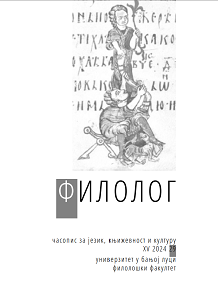АНАЛИЗА СТАВОВА СТУДЕНАТА АНГЛИСТИКЕ У БОСНИ И ХЕРЦЕГОВИНИ О ПРЕВОДИМА ИНДИРЕКТНИХ ГОВОРНИХ ЧИНОВА С ЕНГЛЕСКОГ НА МАТЕРЊИ ЈЕЗИК
ANALYSIS OF ENGLISH LANGUAGE STUDENTS’ ATTITUDES IN BOSNIA AND HERZEGOVINA REGARDING TRANSLATIONS OF INDIRECT SPEECH ACTS FROM ENGLISH INTO THE NATIVE LANGUAGE
Author(s): Suzana S. MarkovićSubject(s): Language studies, Higher Education , Translation Studies
Published by: Филолошки факултет Универзитета у Бањој Луци
Keywords: indirect speech acts; translation; politeness; context; questionnaire; culture;
Summary/Abstract: This paper analyses the attitudes of English language students in Bosnia and Herzegovina regarding the translation of indirect speech acts from English into their native language. Indirect speech acts are specific as a cultural phenomena, which achieve linguistically expressed politeness and they are primarily typical for Anglo-American culture, while Balkan countries tend to prefer more direct forms of communication. The aim of the paper is to examine how English language students perceive the question of translating indirect speech acts, specifically whether it is necessary to adhere to the indirect, often interrogative sentence form in translation from the source language to the target language, or whether it is necessary to include some other parameters such as context, level of formality in communication, interpersonal relationships and so on. In order to conduct this research, a questionnaire was developed and distributed among students from all years of study and master’s programmes in several university centres in BiH. The conclusion we reached is not uniform, and it cannot be said that English language students consistently advocate for maintaining the indirect form in all contexts or require explicit illocutionary force of indirect speech acts.
Journal: Филолог – часопис за језик, књижевност и културу
- Issue Year: 15/2024
- Issue No: 29
- Page Range: 271-287
- Page Count: 17
- Language: Serbian

